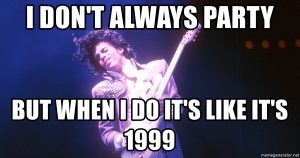by Gabrielle C. Durham
 In the immortal words of Prince Rogers Nelson’s party gem from 1982:
In the immortal words of Prince Rogers Nelson’s party gem from 1982:
“But life is just a party, and parties weren’t meant to last . . .
“So tonight I’m gonna party like it’s 1999.”
So much fun stuff happened in 1999: rampant concern about Y2K; the movie “The Matrix” came out; Bill Clinton’s ongoing inability to keep his dick in his pants and subsequent impeachment and acquittal; former pro wrestler Jesse Ventura became governor of Minnesota; U.S. military college The Citadel graduated its first female cadet; the Elian Gonzalez controversy raged in the States; and Cher’s single “Believe” was released.
But do you remember what you said? Do you remember when something made you laugh, not LOL? It was not actually all that long ago, TBH. Back in 1999, reading a text typically meant applying a highlighter, most likely in neon yellow, to the testable information in a book or handout that the teacher assigned. It has a very different meaning from today’s pithier text message. In a score of years, English has changed. Duh, language is always changing; that’s how it stays alive. But if we think about it at all, we think of language change as being in evolutionary terms – something that takes generations, but it actually happens much more quickly.
What about the words we’ve left behind, like Kirk Cameron’s mainstream film career? Will there be reason to repurpose the purple-staining, distinctively chemical-smelling “mimeograph” ever again? What about floppy disks? Will they ever be relevant again? Do you still have a Sony Walkman® or Discman® hanging around your home? “Walkman” is not in most folks’ lexicon these days. Will the word “cassette” move onto a second life? Maybe that’s where our cremains (puke) will be stored inconspicuously because urns are just too Baby Boomer, too bombastic, too bloody big.
We have apps on our phones, but if you ever worked in a restaurant, you know that word to mean the fatty, deep-fried deliciousness you try to sell the heck out of, along with booze, to pad your customers’ bill.
The only binge I remember, somewhat, is drinking in the 1990s. Now, we binge watch shows on our TVs, computer monitors, and phones. To me, that activity seems just as destructive to brain cells as imbibing the alcohol unrestrictedly, but I’m a dinosaur, the hitherto unknown Gen-X Gabasaurus Regina.
What about the pathetic trend of the stay-cation? “Really, it’s like a break from work but I don’t have to pay for transit or hotel, just my regular life that I had hoped desperately to escape for 7 days.” The costs are what make a vacation, not the seeing stuff or getting away from your regular life, obvs.
These recent coinages and changes in meaning happen because we make them happen. That damn recession from 2008 until 2 months ago forced us to shop in our closets (puke again) and stay-cate. We added a minuscule amount of sparkle to these sad concepts by altering the wording.
As groups, marginalized or not, become more vocal and mainstream, they change our language. “Camp” owes its origins to Polari, a mostly extinct language created and used by British gay men in the 1960s and 70s. Few women emerge unscathed from “mansplaining,” courtesy of (typically white) male privilege and “men’s unsupported overconfidence” (Solnit, 2012). And we all should be striving to be more “woke.”
We are not even mentioning emoji, which were created in 1997 to express emotion with a picture. Emoji(s) are distinct from emoticons, which are typed. The laughing tears of joy emoji was named Oxford Dictionaries’ Word of the Year in 2015. We know what it means, but is it really a word? This never would have flown in 1999.
What do we know? Language is always evolving, and some may criticize that it’s going to the dogs as we ignore the rules (the prescriptivists), whereas others acknowledge that the language we hear and use every day simply reflects our reality (the descriptivists).
Just like the Prince to-do we all wished we had been invited to, these words were never meant to last, so we might as well party like . . . we’re in the Matrix.
